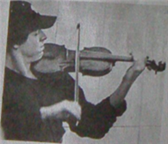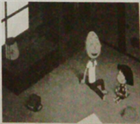—Quite a few.
—No , you ________. It is not as serious as the one we went to last week .
—__________Everything will be fine.
—_________Someone kept talking behind us .

A man sat at an underground station in Washington, D.C., and started to play the violin. It was a cold day in January. He played six Bach(巴赫)pieces for about 45 minutes. It was rush hour and thousands of people went through the station, most of them on their way to work.
Three minutes went by and the first person, a middle-aged man, noticed there was a musician playing. He slowed down and stopped for a few seconds and then hurried up to meet his schedule.
After a minute, the violinist received his first dollar tip: a young woman threw the money in the box and continued to walk. Then another few minutes went by and someone stood against the wall to listen to him, but the young man looked at his watch and started to walk again. Clearly he was late for work.
During the musician's performance, only six people stopped and stayed for a while, twenty gave him money but continued to walk. When he finished playing, no one applauded(鼓掌). No one knew the violinist was Joshua Bell, one of the best musicians in the world.
This is a real story. Joshua Bell playing in the underground station was organized by The Washington Post(《华盛顿邮报》)as part of a social experiment. One of the conclusions from this experiment could be: If we do not have a moment to stop and listen to one of the best musicians in the world playing the best music, how many other things are we missing?

My parents were in a huge argument, and I was really upset about it. I didn't know who I should talk with about how I was feeling. So I asked Mom to allow me to stay the night at my best friend's house. Though I knew I wouldn't tell her about my parents' situation, I was looking forward to 1. I was in the middle of packing up my things when suddenly the power went out in the neighborhood. Mom came to tell me that I should stay with my grandpa until the power came back on. I was really 2 because I felt that we did not have much to talk about. But I knew he would be frightened alone in the dark. I went to his room and told him that I'd stay with him until the power was restored. He was quite happy and said, “3.”
“For what?” I asked.
“To hold a private meeting, just you and I,” he said, “To hold a private meeting about what we're going to do with your mom and dad, and what we're going to do with ourselves 4we're in the situation we are in.”
“But we can't do anything about it, Grandpa,” I said, surprised that here was someone with whom I could share my feelings and someone who was in the same “boat” as I was.
And that's how the most unbelievable 5 in this family started. Sitting there in the dark, we talked about our feelings and fears of life. That night, because the power went out, I found a new friend, with whom I could6talk about all my fears and pains, whatever they may be.
Suddenly, the lights all came back on. “Well,” he said, “I guess that means you'll want to go now. I really like our talk. I hope the power will go out every few nights!”
A. control B. rules C. As a result D. In return E. strict |
Dear Emma,
I have a problem and I need your help. My parents are reallyand never let me do anything! For example , when I go out with my friends , my mom always asks ,” Where are you going? Who are you going with ? “ Two months ago , I got an earring and my father was really angry. He made me take it out. My parents want to everything I do . But I'm 18 years old! I try to talk to my mom and dad , but they don't listen. They say , “This is our house and these are our.” Every time I hear this , I'm very unhappy ., we have a fight . Why is it so hard for them to understand me?
A. express B. surface C. attitude D. realize E. calmly |
Dear Josh,
You asked , “ Why is it so hard for them to understand me ?” That's a good question. You're growing up , but often , it's hard for your parents to this . To them , you are still a child and they want to protect you . Sometimes , you find it hard to your thoughts to parents . Here's my tip : Write your mother and father a letter . Explain your feelings . In the letter , describe your friends and yourself . At the same time , tell your parents about your towards life , too. Then maybe they will understand you better. After your parents read the letter , try to talk to them .
I hope this helps !
Emma
Karen a long time looking at the displays.
does Jeff need to walk to get to his toy store?
The twins had a good time at the new amusement park, ?
The magazines will on the shelves along the windows.
My cousin asked me I ready for the coming interview.

A travel journal(日记)is one of the best ways to keep a long journey in memory. While you are writing your travel journal, many things don't seem s, but they often turn out to be what make the trip so memorable.
It is important to have the hof writing your travel journal every day. When you are on a busy journey, you probably won't remember to write. You may promise that you will write l, but that almost never happens. Take a few minutes every day and put down your memories. It doesn't have to be long.
Use your “down time” p. There is a surprising amount of sitting around while traveling. You can always put down a few lines in your travel journal when you are on trains, waiting for planes, or waiting in line.
In your heading, write down the day, where you are, who you are with, maybe even the weather and what you eat. These are the details that people are most likely to f. After many years when you read your journal, you will know exactly what you were doing on that day.
Focus on writing about how you feel. Listing facts and figures is fine, but that isn't why you traveled. A long journey is a time for self-reflection(自我反思). Memories of these feelings fade(褪去) quickly with time, so it is important to write about those experiences when the memories are still f.
Keep ticket stubs(票根). Whenever you use a ticket for a train or a museum or a ride, stick the stubs to your journal. They are also a good rof your travel experiences. One day you can look at the ticket stubs and see exactly what you were doing on a certain day and how much it cost.
From the time each of my children started school, I packed their lunches. And in each lunch I packed, I included a note. Often written on a piece of small paper, it might be a thank-you for an unusual moment, a reminder of something we were happily expecting, or a bit of encouragement for the coming test or sporting event.

In early grade school they loved their notes. But as children grow older they become self-conscious(有自我意识的), and by the time he reached high school, my older son, Marc, informed me he no longer enjoyed my daily notes. Telling him that he no longer needed to read them but I still needed to write them, I continued until the day he graduated.
Six years after high school graduation, Marc called and asked if he could move home for a couple of months. He had spent those years well, graduation from college, completing two internship(实习)in Washington, D.C., and finally, becoming a technical assistant in Sacramento. However, he had lived away from home except for short holiday visits. With his younger sister leaving for college, I was especially happy to have Marc back. Since I was still making lunch for his younger brother, I packed one of Marc, too. Imagine my surprise when I got a call from my 24-year-old son, asking about his lunch.
“Did I do something wrong? Don't you love me any longer, Mom?” he asked.
“Of course I love you, dear!” I laughingly said. “What's wrong?”
“My note, Mom,” he answered. “Where's my note?”
She gave them a note .
情景提示:
同学们即将初中毕业,班级将开展最后一次班会活动,对于这次班会的主题内容和活动形式,班主任想听取大家的意见。请谈谈你的想法,并给出这样设计的理由。